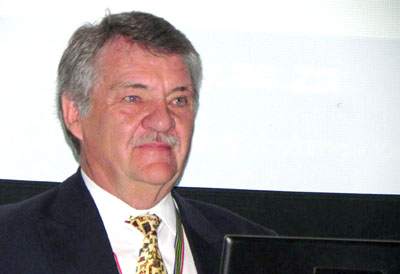Latest News Archive
Please select Category, Year, and then Month to display items
22 September 2021
|
Story Michelle Nöthling
|
Photo Supplied
 Annemarie Le Roux.
Annemarie Le Roux.
“I love working with children.” This is one of the first things Annemarie le Roux mentions when asked to describe herself. This love for children propelled Annemarie into the field of education and she graduated in 2006 with a BEd in Foundation Phase at the UFS. Annemarie immediately immersed herself in the Deaf community, enriching the lives of children at the Thiboloha School for the Deaf in Qwaqwa and the De la Bat School for the Deaf in Worcester.
The academic world enticed Annemarie back to the University of the Free State (UFS) and she was appointed as a junior lecturer in the Department of South African Sign Language (SASL) and Deaf Studies in 2013. Going from strength to strength, Annemarie completed her master’s degree in SASL in 2019, and published an
article earlier this year that she co-wrote with Marga Stander. In this article, they found that SASL “has become an increasingly popular language that hearing university students want to learn as a second language” and subsequently explored different teaching methods used for this emerging group of interested students.
Although now firmly established in academia, Annemarie is still committed to the practical application of SASL. “I am closely involved in student and community engagement through the
SIGNALS Sign Language student association that helps empower the Deaf community and South African Sign Language.” She also interprets for the Deaf community whenever she gets an opportunity, as well as for Deaf students in class and meetings.
On the importance of Sign Language and the recognition of the Deaf community in South Africa, Annemarie believes it will open greater opportunities for development. “More people will be able to learn SASL, and it might even become a subject in school for hearing children.”
Prof. Johan Grobbelaar part of history
2010-09-23
 |
|
Prof. Johan Grobbelaar from the Department of Plant Sciences at the recent 31st Congress of the International Limnological Society (SIL), which was held in Cape Town.
Photo: Supplied
|
The 31st Congress of the International Limnological Society (SIL) was recently held at the Cape Town International Convention Centre (CTICC).
Prof. Johan Grobbelaar from the Department of Plant Sciences at the University of the Free State (UFS), who is also the chairperson of the local organising committee (LOC), worked hard for six years to secure the bid to host the congress in South Africa. The LOC consisted of Prof. Grobbelaar, Prof. Brian Allanson, Prof. Jenny Day, Dr Carin van Ginkel and Dr Mike Silberbauer.
SIL was founded in 1922 to further the study and understanding of all aspects of limnology, the science of inland aquatic ecosystems and their management.
Congresses are held every three years and this was the first time that SIL met on the African continent.
Almost 400 delegates from 42 countries attended this congress where the state of the science of limnology was presented with two keynote speakers, six plenary lectures, 230 oral and 76 poster presentations, mostly running in five parallel sessions. Exhibitions displayed some of South Africa’s role players as well as the latest equipment from abroad. Delegates could also join pre- and post-congress excursions and the new SIL journal, Inland Waters, was launched at the congress.
Many of the presentations dealt with water as a limited resource, pollution problems and the impact of climate change. The congress resolved that SIL would play a more prominent role in creating awareness of problems impacting on inland waters and also afforded solutions. The 32nd SIL congress will be held in Budapest, Hungary in 2013.